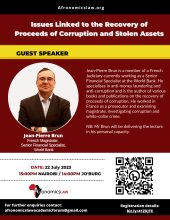Sovereign Debt News Update No. 161: Discrepancies in Cameroon’s Gold Trade Trigger a National Response to Illicit Financial Flows
Recent disclosures under the Extractive Industries Transparency Initiative (EITI) have been critical in exposing these discrepancies by comparing national export data with international trade statistics. These findings have reframed gold smuggling as a systemic governance and fiscal challenge and have prompted renewed policy attention on curbing IFFs, strengthening traceability, and improving revenue capture in Cameroon’s gold sector. This update examines how EITI-exposed discrepancies in Cameroon’s gold export data have brought illicit financial flows into sharp focus, triggered government enforcement measures, and highlighted the role of global trading hubs, particularly the UAE, in facilitating revenue losses from Africa’s extractive sectors.
